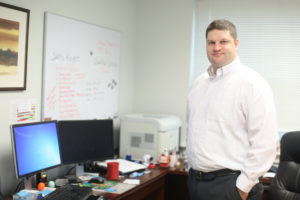As a college student, Tim Saulnier found financial aid a near impossible maze to navigate. Despite repeated attempts, he failed to get help from a counselor and was unable to register for some classes he needed. Now, as UMW’s new director of Financial Aid, he’s laser-focused on providing a more student-centered experience for Mary Washington Eagles.
On the job for the past three months, Saulnier brings plenty of experience to UMW. He spent six years in the financial aid office at UNC Charlotte and, more recently, served as financial aid director for the private Lynchburg University. He’s also finishing up his doctoral dissertation on how to retain second-year students. “I try to create an environment where students are heard,” Saulnier said. “We try to resolve issues, not just dismiss the student.”
Q: What prepared you for your role at UMW?
A: Working my way up in financial aid and holding multiple jobs. I have a master’s in education, and I’m working on my doctorate in educational leadership.
Q: What does a typical day look like?
A: Each day is different. For starters, I attend meetings, help students, troubleshoot system problems, research better practices and ways to improve the student experience, read and implement Department of Education rules and regulations.
Q: What’s the most challenging part of your job?
A: Right now, it’s training new staff, making sure everyone is prepared for their job and making needed improvements with limited resources. Of the eight people in the office, five are new, and one is in a new role. The upside is being able to use these changes to create a whole new environment.
Q: What’s most rewarding?
A: Helping students that really need our help. Advising them not just on financial aid, but on life choices and decisions.
Q: What’s the most commonly asked financial aid question students ask?
A: It varies, but maybe, “How do I get more money?”
Q: What advice do you give students struggling with financial aid?
A: Apply for outside scholarships like it’s a job; the more effort and time you put in, the more likely you are to receive scholarships. Find a student employment job on campus; faculty and staff will become invested in your success and can help you with the many challenges of college.
Q: How does UMW compare to other four-year schools in student debt at graduation?
A: About 58 percent of our students graduate with debt, according to our SCHEV Reports. That’s below the state average. Our current default rate is 1.8 percent, which shows our students are getting good jobs and have the ability to pay back their loans.
Q: What resources are available to students struggling to pay for college?
A: We provide institutional scholarships, need-based gift aid, and merit scholarships awarded at the time of admission. We awarded over $10 million just in institutional aid for 2017-18. (Applications for UMW scholarships in 2019 open Feb. 1 and close May 1.)
Q: Do you have any mottos you live by?
A: No job is beneath me – I wouldn’t ask someone to do a job I’d be unwilling to do.
Q: What’s one thing people would be surprised to learn about you?
A: The number of places I’ve traveled to and lived. After college I lived in Ireland for three months.
